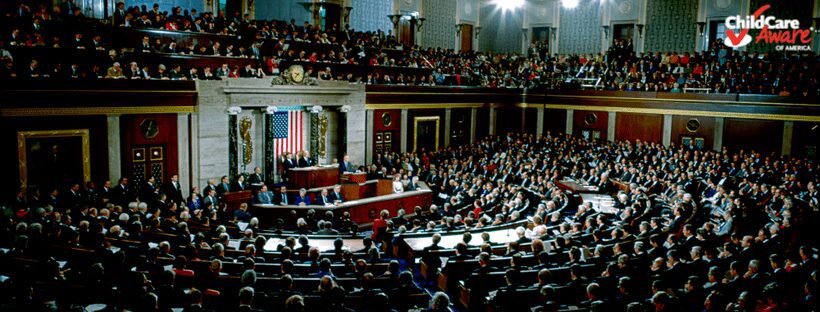
On Thursday, March 7, 2024, at 9 p.m. ET, President Biden will deliver his third State of the Union address. CCAoA urges the president to highlight the importance of child care and the need for additional investments in his speech. To help advocates gear up for the address, we are recapping key child care activity at the state and federal levels over the past year.
Annual Funding
Since this fall, Congress approached and pushed back the deadlines to fund the government for FY24 two additional times. The government is still being funded under a Continuing Resolution (CR) set at FY23 levels while FY24 negotiations are ongoing. Congress has until March 1 to agree on FY24 numbers for three of the annual appropriations bills and March 8 for the rest, including Labor, Health and Human Services, Education (Labor-HHS), which funds child care. House and Senate appropriators agreed on the topline numbers, or spending limits, for the FY24 appropriations bills in January. This means it is a critical moment for child care funding. Members of the appropriations subcommittees are now negotiating the amount of funding actual programs under their jurisdiction will receive, including the Child Care and Development Block Grant (CCDBG) and other early education programs. You can check out our Fall Federal and State Policy Updates Blog, published in October 2023, to learn more about what has happened at the federal level with child care funding.
Stabilization Grants
Federal relief for child care has been a lifeline to the sector. Congress approved $52.5 billion over three separate relief packages to help the child care sector recover and rebuild after the pandemic. Unfortunately, these relief funds are dwindling as we rapidly approach final state liquidation deadlines in 2024. Read our Making the Case for Future Investments through Provider Stories, published in June 2023, to learn how child care advocates have integrated first-hand stories of providers and early childhood educators to convey to policymakers what’s at stake when funding runs out and, most importantly, make a case for continued robust federal investments.
POTUS Executive Order
In April 2023, President Biden signed an executive order with directives to federal agencies to support child care, home-based care, family caregivers and long-term care. These initiatives include supporting the child care workforce, increasing access to affordable, high-quality child care, increasing the supply of child care and improving data and information on the child care workforce. Following this executive order, the Administration for Children and Families issued a Notice of Proposed Rulemaking to strengthen Child Care and Development Fund policies. You can read more about what’s in the executive order in our What President Biden’s Executive Order Means for Child Care blog, published in April 2023.
Notice of Proposed Rulemaking (NPRM)
In July 2023, the U.S. Department of Health and Human Services Administration (HHS) and the Administration for Children and Families (ACF) announced a Noice of Proposed Rulemaking (NPRM) to amend Child Care and Development Fund (CCDF) regulations. The proposed changes are designed to lower families’ child care costs, improve child care provider payment rates and practices, and streamline eligibility and enrollment processes. CCAoA anticipates ACF’s announcement of what is included in the final rule this spring. Read up on what was included initially and CCAoA’s comment letter in response to the announcement by checking out our NPRM hub page.
CHIPS Act
In March 2023, the U.S. Department of Commerce (DOC) announced that companies seeking substantial CHIPS Act funding for semiconductor manufacturing would be required to submit a robust child care plan that reflects the needs of their workers in the communities they plan to build. The department has been working with local leaders and organizations on the child care initiative and guiding chipmakers to satisfy the child care requirement for CHIPS funding. Read more about the CHIPS Act and how it will benefit the child care sector in our press statement, released in March 2023.
State News Updates
Child Care and the 2023 Election
Even when Congress is gridlocked, state and local governments can make significant progress in supporting child care access, affordability and quality. In our Child Care and the 2023 Election blog, published in December 2023, we reflected upon the small yet mighty 2023 election year. We also highlighted how all elections provide an important opportunity for voters to influence their communities. As we gear up for the 2024 election and prepare for the expiration of federal relief funding, we anticipate that child care will continue to be a top-of-mind ballot issue for voters. Check out our State Policy Dashboard to help stay informed of child care-related ballot measures throughout 2024.
What We’re Watching in 2024 in State Legislative Sessions
Building off a busy state legislative year in 2023, CCAoA is tracking how states will prioritize investments that support child care access, affordability and quality this year. It will be imperative for states to address child care investments, as control in Congress remains divided between political parties, contributing to inaction, and states must spend down final pandemic relief funding by September 2024. The good news is that we are beginning to see early indicators of which states will likely advance child care investments this year in governors’ State of the State Addresses and official budget proposals. Check out our What We're Watching in 2024 in States Legislative Sessions blog, published in February 2024, to learn what's next for child care in your state this year.
Conclusion
As President Biden prepares to address the nation, the proof is clear – investment in child care works. Check out our State of the Union hub page to help us keep the conversation focused on child care in the days before, leading up to and after the event. By becoming an advocate today, you can stay in the loop throughout the year on all things CCAoA policy and advocacy.
Become an Advocate




